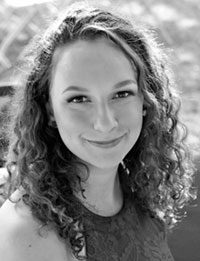AVIVA-Berlin >
Jüdisches Leben
AVIVA-BERLIN.de 7/25/5786 -
Beitrag vom 01.12.2019

Mias column. The Magic of being Jewish
Mia Szarvas
Being Jewish means being part of a group with a strong sense of shared identity, yet boundless and diverse traditions from throughout the world. The magic of being Jewish is feeling a sense of belonging no matter where you find yourself in the world, and discovering the world from your dinner table. As we approach the season of miracles, this is one I will be celebrating.
For more than 2000 years, Jews have been fleeing. After being banished from their homeland in the 700s BCE, they spread out across the Middle East and the islands of the mediterranean. A litany of pursuing persecutions sent Jews across Europe, many settling in Spain, only to be banned again in the 1400s. Along with many other expulsions during the middle ages, this caused Jewish populations to flee again, stretching out across Eastern and Northern Europe, North Africa, and so on. Later, in the 1800s, when Jews were being murdered in pogroms in Eastern Europe, they fled once again, this time to the Americas. Suffering yet another poor fate in the 1930s, Jews fled as far as Australia, China, and sub-Saharan Africa. Most recently, in the 1970s, Jews were expelled from many middle eastern countries, fleeing yet again to other parts of the world. Each time they fled, they took the traditions of their host countries with them. This tragic story of millenia of persecution has birthed one of the most beautiful things in my life - the Jewish diaspora.
Though it is perhaps a gloomy history that has caused Jews to disperse throughout the world, it has led to the rich cultural experience many Jews grow up with today. One of my favorite parts of being American is the diversity of traditions I grew up with, coming to me from hundreds of different cultures, all melting together into one, uniquely American experience. This is also one of my favorite aspects of being Jewish. Jewish backgrounds are varied, traditions slightly different, opening doors and windows to flow through unique portals for expressing what is ultimately a shared identity. I feel belonging most when everyone around me is a little bit different.
A few years ago, on a Saturday evening in Berkeley, California, I sat in a friendôÇs warmly lit living room. About thirty of my dearest friends milled about the room, snacking and chatting. I had spent every Friday with them the past year, breaking bread and blessing wine before digging into a Shabbat meal. But tonight was different. It was the last night of passover, a night that had been, for most of my life, completely unremarkable to me. Though I was surrounded by people with whom I had lived, prayed, travelled across the world, and shared countless Jewish experiences, tonight I was experiencing something completely new: tonight was my first time celebrating Mimouna.
My friend was teaching me about her familyôÇs Jewish tradition, Mimouna, a Sephardic (a word referring to the Jews of Iberia, North Africa, and the former Ottoman Empire) celebration at the end of Passover. Though we had braided challah (a plaited, leavened bread traditionally enjoyed on Shabbat) together weekly for the past few years, a tradition we shared, she had grown up celebrating Mimouna, while I had not. She taught me the customs of Mimouna and the joy of celebrating the end of something. As sweet Moroccan treats melted in my mouth, my friends made it clear to me that this tradition from North Africa was my tradition too.
That is the magic of being Jewish. It is belonging to a culture that has no home. It is belonging to a culture of the world.
Because Jews have spent 2000 years without a home, Jewish homes are boundless, and Jewish traditions have no borders. Jews eat shakshuka from Morocco, shawarma from Syria, and schnitzel from Germany for breakfast, lunch, and dinner, respectively, and when asked about it they would just say this food is Jewish. And it is, just as it is Moroccan, Lebanese, and German. Just as Jews are Moroccan, Lebanese and German.
Jews have lived and breathed so many different places, cultures, languages and identities. The cultures they have been part of have become part of Jewish culture, and Jewish culture has influenced all the places Jews have once been.
Can one really say if a New York deli is something Jewish or New Yorker? No, because New York Jewish Delis are something uniquely New York Jewish. And that means both New Yorkers who are not Jews and Jews who are not New Yorkers feel a particular connection to them.
This magic is what allows Jews to travel from their dinner tables. To learn about new and exotic traditions from across the world while feeling extremely familiar with them, because they are variations of the traditions they have grown up with, the traditions they have always known.
I see the Jewish table as a doorway to the world - food and friends are the key. Which is why I was able to discover the home of my Jewish food traditions, such as latkes (fried potato pancakes) and challah, is actually right here in my new home, my exotic destination. Germany.
As Hanukkah draws near, and I long for my GrandmaôÇs latkes (or levivot, as my Hebrew speaking dad calls them), IôÇm comforted by the ubiquitous stands at German Christmas Markets selling "Kartoffelpuffer", the German name for what are exactly, identically, latkes (although, they canôÇt compete with my GrandmaôÇs).
The first time I saw them in Germany I was upset. I felt they had been stolen. Now I see that German culture and Jewish culture grew up together, and thus no one can reasonably say whether these potato pancakes are Jewish or German. The fact is, they are Jewish German, or German Jewish. When I buy "Hefezopf" (plaited, leavened bread, traditionally eaten on Sundays) at the bakery on Fridays when I am too lazy to make my own challah, no one but the baker would be able to tell me that there is any difference. So although these treats are masquerading here under different names, I know they are just as much mine, as they are my German boyfriendôÇs. And that is what is magical about being Jewish. I was born across the world from my dearest friend, and yet we grew up eating the same foods during our festivals of light, and breaking the same bread with our families.
About: Mia Szarvas was born in Vermont to an Israeli father and Italian-American mother, raised in California, and currently lives in Bremen, Germany. Her grandmother, Marta, escaped from Poland in August of 1939 with her parents and sister, with whom she set up a new life in Palestine, while the family they left behind perished in the Holocaust. Mia has a degree in Political Ecology from the University of California, Berkeley, and works in tech to create empowerment in unexpected places. She is curious about multiculturalism, languages, feminism, and how our intertwined histories inform the present.
Follow MiaôÇs art project "Humans Who Inspire" on Instagram @humanswhoinspire. Mia draws portraits of humans who inspire her as a meditation on the multitude of incredible humans working to make the world a better place. She also accepts requests and submissions.
Read more by Mia Szarvas at AVIVA-Berlin:
"A German Christmas: Jewish Stars and almost no Jews"
"A Resolution for the New Year." Reflections on Being Jewish by Mia Szarvas
"Uncovering Jewish Venice." Reflections on Being Jewish by Mia Szarvas
"LetôÇs Get Uncomfortable ãÎ." Reflections on Being Jewish in Germany by Mia Szarvas
"I Answered All Your Question About Jews, so You DonôÇt Have To (And so I DonôÇt Have To)" - reflections by Mia Szarvas
"I DonôÇt Want Your Shame" - reflections by Mia Szarvas
Yom HaShoah - reflections by Mia Szarvas

Photo of Mia Szarvas by Elena Sloman